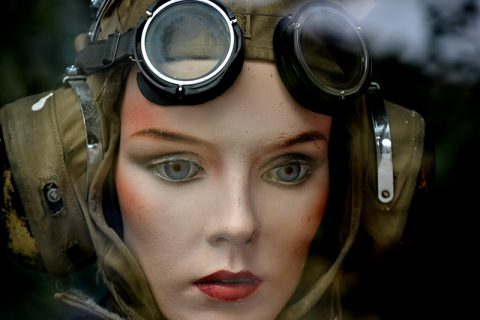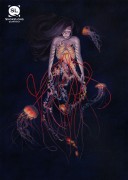I’m curious to find out about your writing style. I understand that you write in different languages. Do you find one harder/easier to write in than the other? Also, do you see your writing style change depending on what language you write in?
The language in which I write definitely influences how I write. When I began writing in English, for example, I had to simplify my sentence structure. My command of English wasn’t strong enough to create the same type of layered sentences I was accustomed to writing in Dutch (my mother tongue). At first, this was frustrating—I like complex ideas and intentional ambiguity—but forcing myself to write more simply has actually helped me to think more clearly. My style in English is more to the point, I think, perhaps even punchier.
At the moment, I prefer writing in English, because it’s a more flexible language than Dutch, with more possibilities to vary the order of words. (Something I highly appreciate.) English also has the progressive verb form, a fantastic tool, especially for describing simultaneous actions. Since I’ve been using it, writing in Dutch has become more challenging, and I often find myself looking for acceptable alternatives.
Overall, writing in two languages has made me more aware of the words and grammar I use; it has made me fall in love with writing even more.
“If Jan-Willem could do it, so could I.” The tone here seems to drip with getting even. Was this whole thing about revenge or was it more that she feels she’s been missing out?
The narrator would love to take revenge on Jan-Willem, I think, but she sees no possibility to do so (with the exception of fighting his lawyer). She knows that Jan-Willem can’t see her seducing the young surfer and won’t be hurt when he learns she has moved on. Her copycat behavior is intended to make herself more powerful. She wants to transform herself from a victim into a woman who controls others. But love isn’t without risks. Once she allows herself to fall for Jasper, she is once again vulnerable.
This surfer hunk who is Herculean boy sometimes—did the narrator give him this title as a pedestal to stand on or was it because she wanted to completely contrast him against the ex-husband?
I don’t think the narrator takes Jasper very seriously when she calls him her Herculean boy. She is attracted to him, sure, but she also mocks his physique. She makes the clichéd mistake of equating beauty (his Grecian muscles) with superficiality. To make him her boy toy, she must reduce him to a body, a body that knows how to satisfy her. He doesn’t become a real person until he has homework and develops a conscience about what he’s doing.
The narrator keeps calling Jasper’s girl his fake-girlfriend. Is that so the reader can just brush her off, or did you leave her nameless for a deeper reason?
Yes, anyone you don’t name is easily brushed off, taken to be irrelevant. But I also love the symbolic weight of names, the power there is in naming things and hearing your own name called out. The fake-girlfriend remains nameless because she is destined to become an abandoned woman and take over the role of the narrator, who also remains nameless. If the story had been any longer, I might have played with this theme more. I can imagine the narrator in one of the later scenes asking Jasper to say her name and watching the letters roll off his tongue.
The ending, which I completely didn’t expect and loved by the way, was definitely a moment I had to re-read. Why the desperate act of death?
That’s a question I cannot answer. Why do people commit suicide? Was the fake-girlfriend already depressed? Temporarily insane? How can we ever know why someone does one thing and not another?
The story hopefully shows that no matter how hard we try, we can never control life. We have our intentions, but others will do unexpected things. Even when we copy the exact circumstances of a previous event, life (or death) refuses to submit. All we can do is try to keep our balance, no matter what.



 The core workshop of SmokeLong Fitness is all in writing, so you can take part from anywhere at anytime. We are excited about creating a supportive, consistent and structured environment for flash writers to work on their craft in a community. We are thrilled and proud to say that our workshop participants have won, placed, or been listed in every major flash competition. Community works.
The core workshop of SmokeLong Fitness is all in writing, so you can take part from anywhere at anytime. We are excited about creating a supportive, consistent and structured environment for flash writers to work on their craft in a community. We are thrilled and proud to say that our workshop participants have won, placed, or been listed in every major flash competition. Community works.